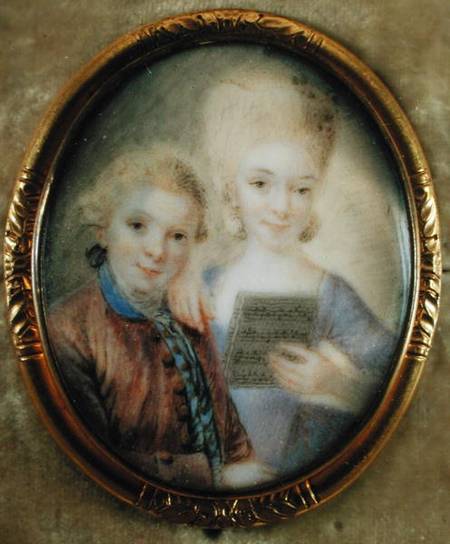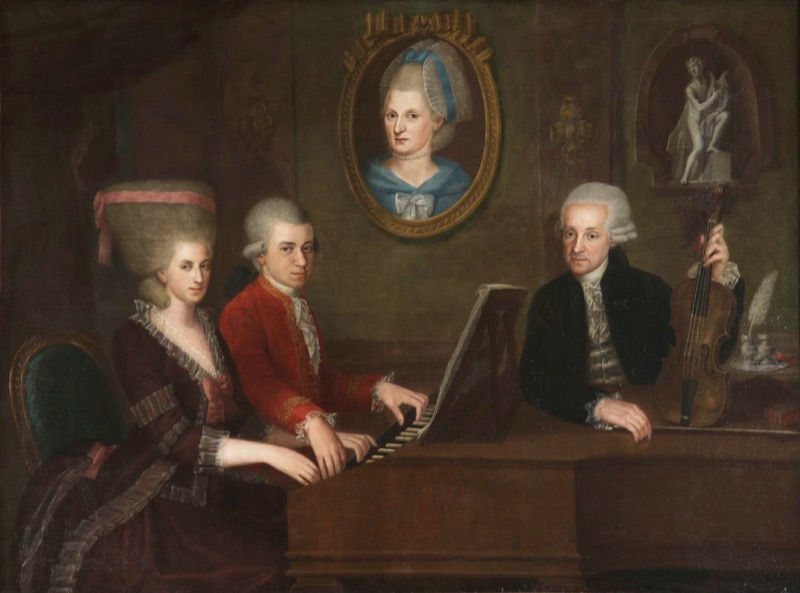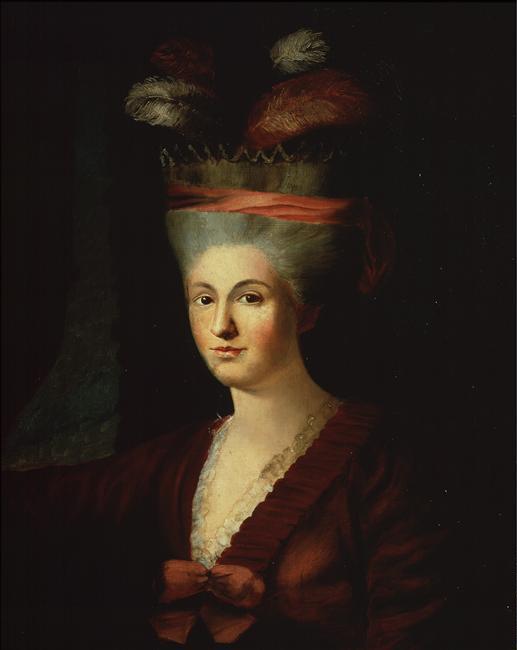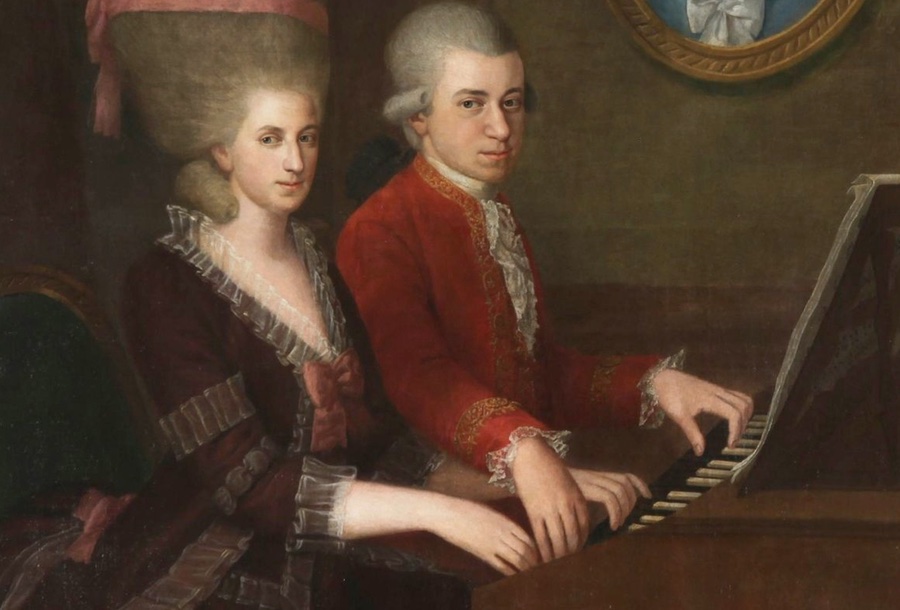Did Wolfgang’s sister teach him everything that he knew? We explore the life of the extraordinary woman in an incredible family
Subscribe to All About History now for amazing savings!
In 1829, the English author Mary Novello visited the ageing Maria Anna Mozart, sister of the celebrated composer. She was shocked by what she found — not only was the old woman blind, but she was living what appeared to be an impoverished life. Feeble, exhausted and barely able to speak, the lonely woman was a sad sight to behold. That same year, Maria Anna died aged 78 and was buried in her birthplace of Salzburg, Austria. However, Novello had been wrong. Looks can be deceiving: the old woman was not impoverished, she left a large fortune behind, but had chosen to live frugally.
Very few people truly knew Maria Anna or the life she had led, for much of it had been in the shadow of her brother. Even today we don’t know the extent of her talents as, like most female musicians from the past, her work was not recorded and she herself was never given the chance to thrive. What could have been for the old, blind, feeble woman will never truly be known, but the role she played in her brother’s life, hailed as one of the greatest masters of all time, is a truly remarkable — if seldom told — tale.
Maria Anna, better known by the affectionate nickname Nannerl, was born in the summer of 1751 to Anna Maria and Leopold Mozart. Her mother had certainly not led an easy life as her family had fallen into poverty when she was young and was forced to live on a charity pension. Anna Maria was also constantly ill. Although she had attracted Leopold with her beauty, the marriage was plagued by misfortune, and they sadly lost five children in infancy. It is perhaps due to this difficult life that she was so willing to submit to her husband’s strict regime.
Leopold was not an easy husband to live with and certainly not an easy-going father. Headstrong, determined and stubborn, he had disobeyed his mother’s wishes of entering the priesthood so that he could pursue a life of music as a violinist and organist. This decision to chase his dream estranged him from his mother, but it made him all the more determined to succeed. Many biographers emphasise the impact Nannerl’s father had upon her, but it was the combination of her parents — a ruthlessly ambitious father and a mother willing to let him do anything — that would shape her life.
When a young Nannerl, aged just seven, sat down before a harpsichord and began to play, she was immediately followed by her younger brother, Wolfgang. The boy was four and a half years younger than her and idolised his sister — Nannerl was imaginative and kind and Wolfgang adored her. The two invented a secret language only they could speak and daydreamed about an imaginary kingdom called Back, where they ruled together as king and queen.

It only made sense that once Nannerl was old enough to learn to play, Wolfgang would immediately wish to do the same. At the age of just three, Wolfgang was uncommonly young to begin his musical education, but he had the advantage of a sister willing to act as teaching assistant to their father’s tutelage, demonstrating and interpreting. Both children quickly excelled.
By 1762, Leopold believed his two little prodigies were ready to work as concert performers and their skills were proven when, during a visit to Vienna, they played for Empress Maria Theresa at the imperial court. Immediately recognising the opportunities his two children presented him and the gimmick of their young ages, Leopold wasted no time and quickly pushed aside his own dreams of success to focus on his children. In 1763, he planned a grand tour that would ensure the siblings and their musical talent would make waves among the most powerful people in Europe.
The Mozart family’s grand tour was extensive, lasting three years, with the entire family travelling to the biggest cities in central and western Europe. When Leopold had planned the tour, it was certainly not with monetary gain in mind — in fact, much of the profit made went towards lavish living expenses.
Leopold had something to prove. He wished to make an impact across the continent with his children’s talents. He himself had been promoted to deputy Kapellmeister, or conductor, in the orchestra of the Prince-Archbishop of Salzburg, but he would rise no further. He would be ignored and watch others promoted above him for years to come, but it was a sacrifice he was willing to make for he saw something more worthwhile in his son and daughter. As strict and domineering as he was, Leopold was utterly and completely devoted to his children and willing to sacrifice pretty much anything for them.
For Nannerl, the experience was life-changing, breathtaking and eye-opening. Aged just 11, and a girl at that, she was able to see and experience things that few others would in their entire lifetime. Music had instantly transformed her life and, although her father’s schedule was demanding and no doubt exhausting, she adored playing for the princely courts they visited.
Although it is Wolfgang who would no doubt receive top billing today, in much of the contemporary promotion material it was Nannerl who headlined the show. Her skill in playing pieces written by the masters led her to be hailed as “virtuosic”, “a prodigy” and a “genius”. She wowed audiences across Europe from Munich to Paris, London to Zurich.
This was certainly not a tour for the young Wolfgang on which his sister simply just tagged along. It would have been natural for Wolfgang, the tiny little seven year old in his wig, his short legs barely reaching the pedals, to achieve the most attention, but his sister’s skills shone through. As her father wrote, “Nannerl no longer suffers by comparison with the boy, for she plays so beautifully that everyone is talking about her and admiring her execution.”
However, there was one key difference between the two: after a childhood spent watching her mother obey her father, Nannerl learnt to be very good at doing what she was told. Wolfgang, on the other hand, was encouraged to create.

While touring just outside London in 1764, Leopold fell ill and the two children were ordered to keep it quiet. Wolfgang took this opportunity to go to his closest companion, his sister, and request she write down his first symphony. Years later, Nannerl would recall that he said, “Remind me to give something good to the horns!”
It is impossible to know if Nannerl simply wrote down what her brother told her to or if she collaborated and offered some ideas. However, it seems unlikely that he would request his sister only to be a quiet scribe. He adored and idolised her. Naturally there may have been some sibling rivalry, but he undoubtedly respected her abilities, so it is not too much of a leap to say that she could have made suggestions.
The piece is ultimately credited to Wolfgang, and it is important to recognise his gift and talents even at so young an age. But it is also inconceivable to ignore the influence and role his sister played in his musical development, especially in his formative years, whether that was as a fellow composer, or simply a source of encouragement during those early years.
Unfortunately, this partnership would experience a sudden and severe fracture. In 1769, Nannerl turned 18, meaning she was of marriageable age, which, as far as her father was concerned, signalled the end of her performing career. One wonders if Leopold would have taken this decision if he did not have her younger brother to focus on, such was his dedication to his children’s gifts. But the fact is he did, and we will never know how far Nannerl’s abilities would have developed had she had the stage to perform them on. As far as society was concerned, it was fine for a little girl to travel and perform, but for a woman it would be scandalous — and Leopold could not risk her ruining the reputation of his prodigious son. As father and son continued to travel Europe and play to distinguished audiences, Nannerl now remained at home with her mother.
Although Nannerl wrote much correspondence, there is no record of her bemoaning this fate or showing any contempt towards her father for it. Not only was she astonishingly obedient, she was a product of her time. This world was not one where women had their own voice; had she fought her father on this issue, the scandal would have been devastating for the family, so the girl whose life had been led by music and travel stopped performing and did as she was told.
It is very clear that Wolfgang missed his sister immensely. Throughout his letters he pines after her, writing “I only wish that my sister were in Rome”, and, when waiting for her letters, ”I have had an aching feeling, because I have been so long waiting in vain for an answer.”
Although they were apart, the strong relationship between the two was obvious. Wolfgang jokingly refers to her as “horseface” and wrote to her with the same bawdy humour he shared with his closest companions. Significantly, he sent her compositions and craved her approval, repeatedly demanding her to “tell me quite frankly how you like it” and begging her to write to him, even if she has nothing to say.
Nannerl was forced to watch her younger sibling be praised while she languished, but she appeared to hold no ill will or grudges. Most impressive of all, and a testament to her spirit, is that although the glamour of the stage had been taken from her, Nannerl did not stop indulging in music. Not only did Wolfgang send her a number of works to perform, but there’s evidence that she herself wrote her own, as in 1770 he wrote, “I am amazed to find how well you can compose. In a word, the song is beautiful. Try this more often.” Enthusiastic, encouraging and thoughtful, Wolfgang was unwilling for Nannerl to lose her connection to the thing that had brought them closer — music. Nannerl, as obliging as she was to her father’s wishes, continued to play.

Wolfgang, however, was a little too much like his father in one way in particular — his headstrong rebelliousness. Leopold wished for his son to obtain a professional position, something that was especially pertinent when Wolfgang and Maria Anna’s mother died in 1778, and the salary would have enabled Nannerl to leave Salzburg. However, he moved to Vienna without a salary in 1781 and married in 1782. Leopold remained in Salzburg with his daughter, and the two of them shared a degree of disillusion in Wolfgang. Nannerl had followed her father’s wishes dutifully, but Wolfgang had acted out, and rather selfishly, too.
It became vitally important for Nannerl to find a suitor. She was intensely in love with a man called Franz Armand d’Ippold, but this union came to nothing and instead she married the twice-widowed Johann Baptist von Berchtold zu Sonnenburg, who already had five children from his previous marriages. The reason why the two lovers did not marry is unknown, but a popular theory is that Leopold stopped it. Either he did not approve of the match, or preferred having Nannerl at home as the lady of the house after losing his wife and, for all intents and purposes, his son.
Wolfgang encouraged Nannerl to stand up for her own preference, but she was becoming disenchanted with her rebellious little brother and became more subordinate to her father. Nannerl did not marry until she was 33, unusually late for the era, and there is no good reason for this: she was clever, talented and well-mannered. So the idea that Leopold didn’t want to release his grip on her is not an outrageous one.
Nannerl finally moved out of the family home to Sankt Gilgen, a rural town east of Salzburg, to live with her new husband. Her married life was not an easy one — she had to care for five ill-educated stepchildren and, while her brother achieved fame, she relied on her father’s aid. Although it is easy to look on Leopold with scorn, he obviously was greatly committed to his daughter, as he did shopping for her, arranged servants and paid for her brother’s music to be sent to her. When she visited him, he collected musicians together so she could play with them and even encouraged her to stand up to her husband.
This close relationship with her father distanced the two siblings further, as Leopold did not at all approve of his son’s wife, Constanze. The pair had very little presence in Wolfgang’s new life, but Nannerl still requested new pieces from her brother to play. It’s thanks to Nannerl preserving this pieces that many of Wolfgang’s cadenzas for the piano concertos survive today.
In the summer of 1785, Nannerl gave birth to her first child, a son, who she named after her father. She had travelled home to Salzburg to give birth, and when she returned to Sankt Gilgen she did not bring the boy with her. Leopold wanted to raise the child himself, first for a few months and then indefinitely. Although the boy’s ill health in infancy could account for this, it doesn’t explain why he remained there once he got better. It is possible that Leopold saw in his grandson a chance again to harvest musical genius, and he began giving him musical training at a very young age.

It is perhaps indicative of Nannerl’s total subordination to her father that she let this happen and saw her son on very few occasions. Wolfgang heard about the arrangement through a mutual acquaintance and, when he asked his father if he could care for his own children while he was on tour, Leopold refused. Leopold recounted this to Nannerl by saying, “He found out that the child is with me, which I’d never told him: so this was how the good idea occurred to him or perhaps his wife. That would certainly not be bad, — They could travel in peace, — could die, — could stay in England, — then I could run after them with the children.” Musical genius or not, it was very clear at this point who the favourite child was.
However, Leopold died in 1787 and Nannerl finally had to live her own life without his support. By the time Wolfgang heard of his father’s death, he was already buried but, estrangement aside, the passing of such a strong and central figure in their life devastated both siblings. Wolfgang and Nannerl had written countless intimate letters to each other in their youth, but their correspondence now mainly concerned their father’s estate and, by 1788, they stopped writing entirely.
In 1801, Nannerl’s husband died, and for the first time she was free of the influence and orders of men. She returned to Salzburg with her children and earned a living as a music teacher. Throughout everything, her love for music had endured.
Wolfgang died from a mysterious illness in 1791, and this seemed to awaken Nannerl to the relationship they once had. She wrote pieces for his biography and supplied many anecdotes about the brother she had known and loved. Despite being as disapproving as her father of Wolfgang’s wife, she put that aside to work with Constanze on her brother’s biography. Together the two women played an enormous part in assembling and handing down musical source material.
She later wrote that when reading about her brother, her sisterly feelings were completely reanimated and she was often reduced to tears at the “sad condition” he found himself in. For Nannerl, her affection towards the little boy who would strive to copy his sister had never truly vanished, and now she did everything she could to preserve his memory and promote his work.
We have much to thank Nannerl for, as it was the period following Wolfgang’s death that helped his reputation to grow. She gave over all of her private correspondence in order to see her little brother get the attention he deserved and, most likely, to help her beloved father achieve that which had been his life work — to create a musical legend.
Originally published in All About History 55
Subscribe to All About History now for amazing savings!

